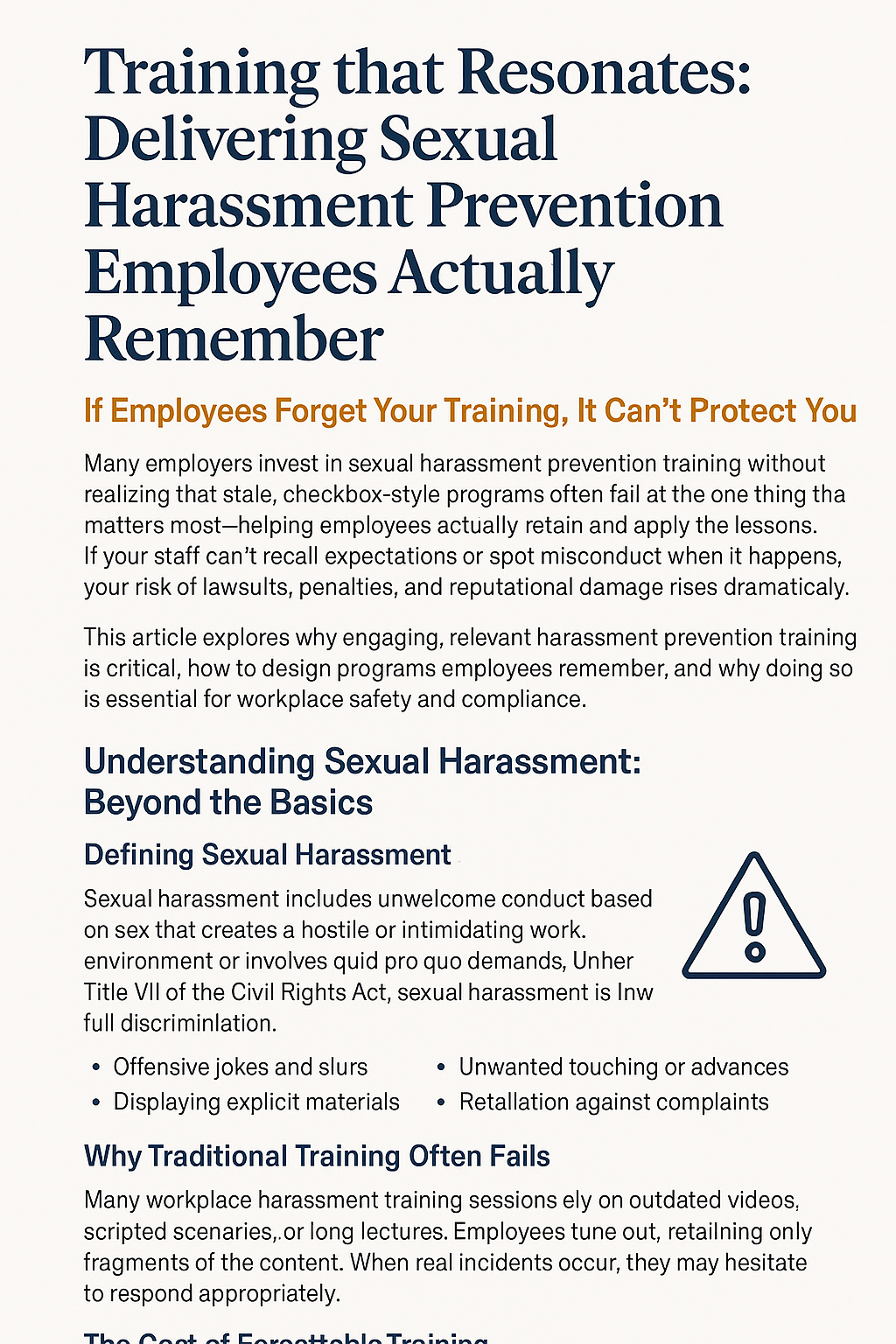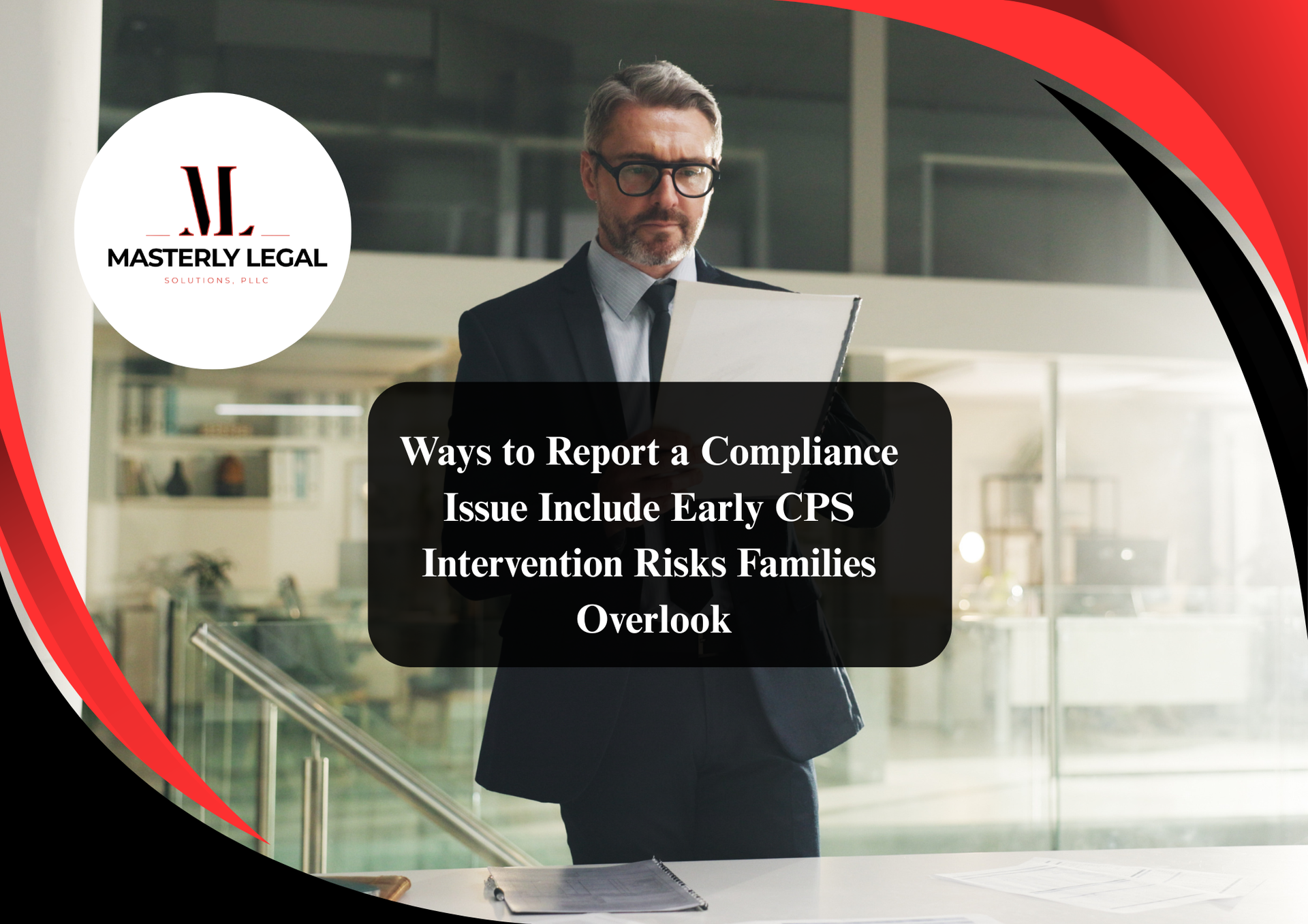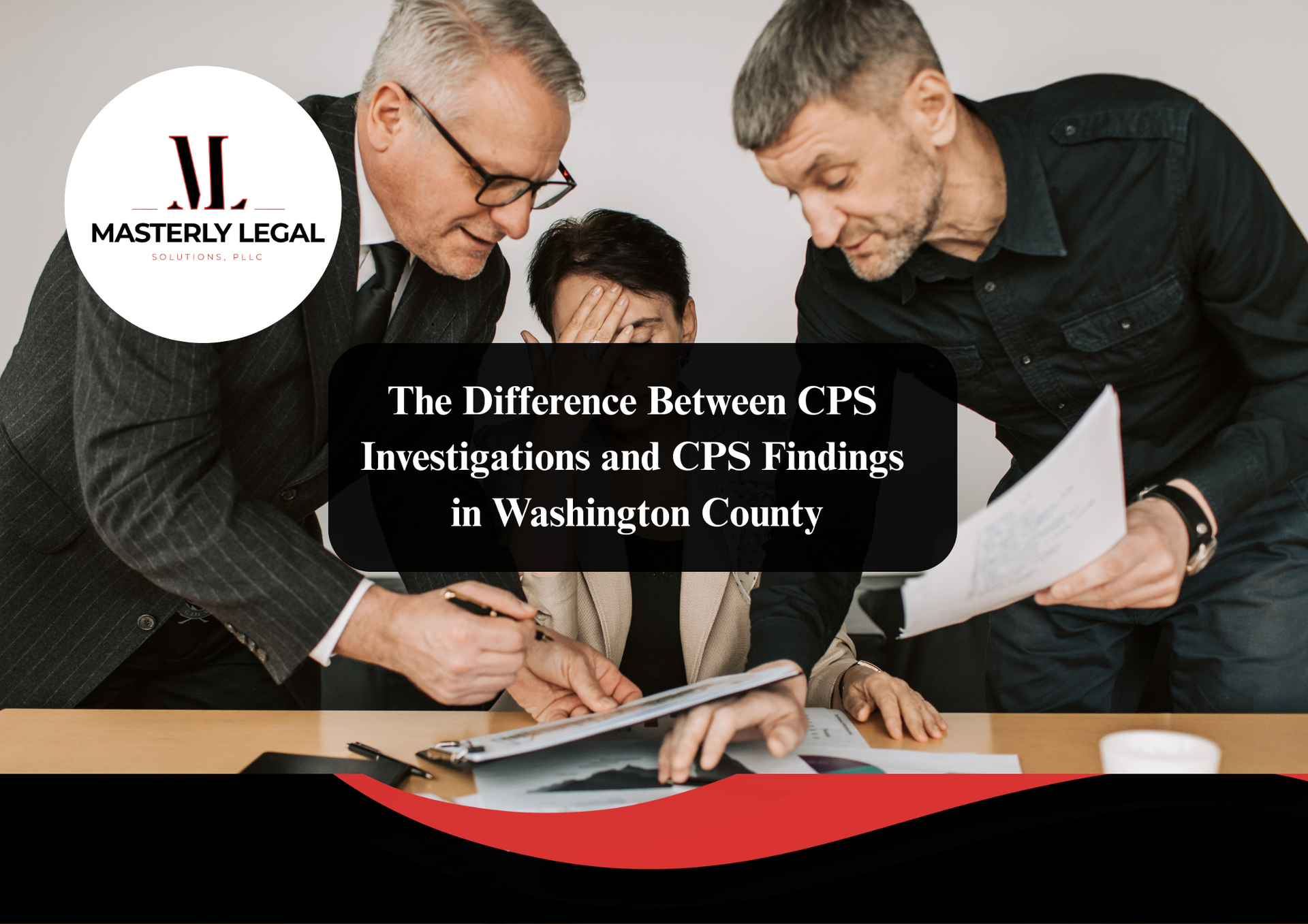Training that Resonates: Delivering Sexual Harassment Prevention Employees Actually Remember
If Employees Forget Your Training, It Can’t Protect You
Many employers invest in sexual harassment prevention training without realizing that stale, checkbox-style programs often fail at the one thing that matters most—helping employees actually retain and apply the lessons. If your staff can’t recall expectations or spot misconduct when it happens, your risk of lawsuits, penalties, and reputational damage rises dramatically.
This article explores why engaging, relevant harassment prevention training is critical, how to design programs employees remember, and why doing so is essential for workplace safety and compliance.
Understanding Sexual Harassment: Beyond the Basics
Defining Sexual Harassment
Sexual harassment includes unwelcome conduct based on sex that creates a hostile or intimidating work environment or involves quid pro quo demands. Under Title VII of the Civil Rights Act, sexual harassment is unlawful discrimination.
Examples include:
- Offensive jokes and slurs
- Unwanted touching or advances
- Displaying explicit materials
- Retaliation against complaints
Why Traditional Training Often Fails
Many workplace harassment training sessions rely on outdated videos, scripted scenarios, or long lectures. Employees tune out, retaining only fragments of the content. When real incidents occur, they may hesitate to respond appropriately.
The Cost of Forgettable Training
If employees forget what’s acceptable, your company faces significant risks:
- Legal liability for unlawful harassment under federal or state law
- Financial penalties imposed on illinois employers and other states’ organizations
- Damaged reputation that affects recruiting and retention
- Civil claims that can drain resources
Crafting Training That Sticks
What Makes Harassment Prevention Training Memorable?
To be effective, training must:
- Feel relevant to employees’ daily experiences
- Present clear examples of unacceptable behaviors
- Use interactive methods, not just passive learning
- Include opportunities for discussion and questions
Focusing on Key Concepts
Training should emphasize essential principles such as:
- What constitutes sexual harassment and workplace harassment
- How to recognize intimidation, discrimination, and retaliation
- When to report incidents and how to document them
Interactive Techniques Drive Retention
The Power of Storytelling
Sharing real-world scenarios helps employees connect emotionally to the material. Storytelling demonstrates how harassment and offensive jokes escalate and what bystanders can do to intervene.
Role-Playing Exercises
Practicing how to respond or report an incident boosts confidence. In role-play, employees can safely explore conflict resolution techniques.
Quizzes and Recaps
Short quizzes reinforce comprehension and identify areas needing additional information or clarification.
Addressing Unique Workplace Cultures
Industry-Specific Challenges
Certain industries, such as hospitality or sales, may face elevated risk. Tailored harassment prevention training reflects the unique pressures and expectations of each environment.
Inclusion Training Supports Prevention
Integrating inclusion training into your program helps employees understand the value of a respectful work environment.
Digital Solutions: Online Training That Engages
Benefits of Online Training Modules
Modern online training options offer:
- Flexible schedules for remote and onsite employees
- Interactive elements like click-through scenarios
- Immediate tracking of course completion
Avoiding the Pitfalls of One-Size-Fits-All Courses
Generic online modules often lack nuance. Choose sexual harassment prevention training built for your organization’s size, culture, and risk profile.
Legal Requirements Employers Must Know
Federal Mandates
Under Title VII and EEOC guidance, employers with one or more employees must prevent harassment and discrimination.
State-Specific Requirements
Illinois employers, California businesses, and New York City employers all face specific annual training mandates.
For example, Illinois requires:
- Annual training for all employees, including non supervisory employees and supervisors
- Clear instruction on how to report harassment
Documenting Compliance
Maintain thorough records of training start dates, participants, and content. This documentation can be crucial if claims arise.
Building a Culture of Respect
Leadership Sets the Tone
Managers and supervisors must model acceptable behaviors and take complaints seriously. Leadership buy-in increases participation and trust.
Ongoing Communication
Discussing workplace harassment prevention regularly helps keep the topic visible. Employees should never feel that harassment training is just an annual obligation.
Reinforcing Knowledge with Follow-Up
Post-Training Resources
Provide accessible reference materials outlining:
- The sexual harassment prevention policy
- Steps to report incidents
- Contact information for HR or technical support
Scheduled Refreshers
Periodic updates—whether via emails, micro-learning, or live sessions—help employees retain knowledge.
Common Training Pitfalls to Avoid
Overloading Employees with Legal Jargon
While compliance training must address the law, complex terminology can overwhelm learners. Clear, plain-language explanations help employees engage.
Ignoring Cultural Dynamics
Organizations that fail to consider cultural norms or diverse perspectives risk alienating employees. Respectful, inclusive content is vital.
Addressing Retaliation and Reporting Fears
Encouraging Reporting Without Fear
Retaliation remains a common concern. Emphasize that retaliation is unlawful harassment and will not be tolerated.
Clarifying the Investigation Process
Training should explain:
- What happens when a report is made
- How confidentiality is maintained
- The roles of HR and management in resolving incidents
The Role of Managers and Supervisors
Special Responsibilities
Supervisors have enhanced duties to prevent harassment, respond to complaints, and enforce policies.
Manager-Specific Training Content
Manager courses should cover:
- How to recognize potential problems early
- Proper documentation procedures
- Appropriate responses to complaints

Creating a Respectful Work Environment
Encouraging Positive Conduct
Training should highlight examples of acceptable behaviors and how they contribute to a positive culture.
Recognizing and Preventing Harassment
Employees must learn how to prevent harassment before it escalates into serious incidents.
Incorporating Harassment Prevention into Onboarding
Starting Early with New Employees
Onboarding is the perfect time to set expectations. Incorporate harassment prevention training as a standard part of the process.
Reinforcing Throughout Employment
Annual training and periodic refreshers keep information top of mind.
Leveraging Technology for Better Outcomes
Tracking Completion and Retention
Modern systems track training progress and retention, giving employers clear records.
Customized Training Paths
Adaptive learning platforms can tailor content based on employee roles and prior knowledge.
Measuring Training Effectiveness
Post-Training Surveys
Gather feedback to understand whether employees feel confident recognizing and responding to harassment.
Incident Reporting Trends
Monitor whether reports of misconduct rise or fall after training. An increase may indicate employees feel safer coming forward.
Your Organization’s Reputation Is at Stake
Sexual harassment prevention training isn’t just about avoiding penalties. It’s about fostering a workplace culture where everyone feels safe, respected, and valued.
An investment in memorable, engaging training pays dividends in productivity, morale, and brand reputation.
Strengthening Your Workplace with Comprehensive Harassment Prevention
To effectively address workplace harassment, companies must adopt proactive workplace harassment prevention training that goes beyond surface-level policies. A well-designed program educates employees about respecting differences, including those related to national origin, and equips managers to comply with evolving legal standards.
Providing clear procedures and accessible forms empowers your team to report concerns confidently and ensures your organization can respond swiftly and appropriately. By integrating these tools, you demonstrate that prevention and accountability are core values—not just obligations.
Elevating Compliance and Protection Through Effective Training
Implementing sexual harassment training for employees is no longer an optional gesture—it’s a critical component of your company’s risk management strategy. Businesses that invest in consistent sexual harassment prevention training and broader harassment training send a clear message that misconduct will not be tolerated and that every team member deserves respect.
When you combine legally compliant programs with ongoing compliance training, you create a culture where employees understand expectations and feel empowered to speak up. Make sure you provide additional information—such as reporting procedures, documentation requirements, and escalation protocols—to reinforce that prevention is part of your organization’s daily practices, not just an annual event.
Ready to Elevate Your Training?
If you’re concerned your sexual harassment prevention training doesn’t truly resonate with your employees, it’s time to act. Masterly Legal Solutions helps employers design courses employees remember—and apply.
Contact us today for a free consultation. We’ll answer your questions and help you develop a program that protects your team and strengthens your organization.
Call us now at (972) 236-5051 to speak with our compliance training professionals.
Disclaimer: This page is not legal advice; rather, it is meant to be a general source of information. Please get advice from knowledgeable counsel regarding your particular circumstances
Looking for Legal & Business Solutions? Contact Us Now
Fill in the form or call us to set up a meeting














